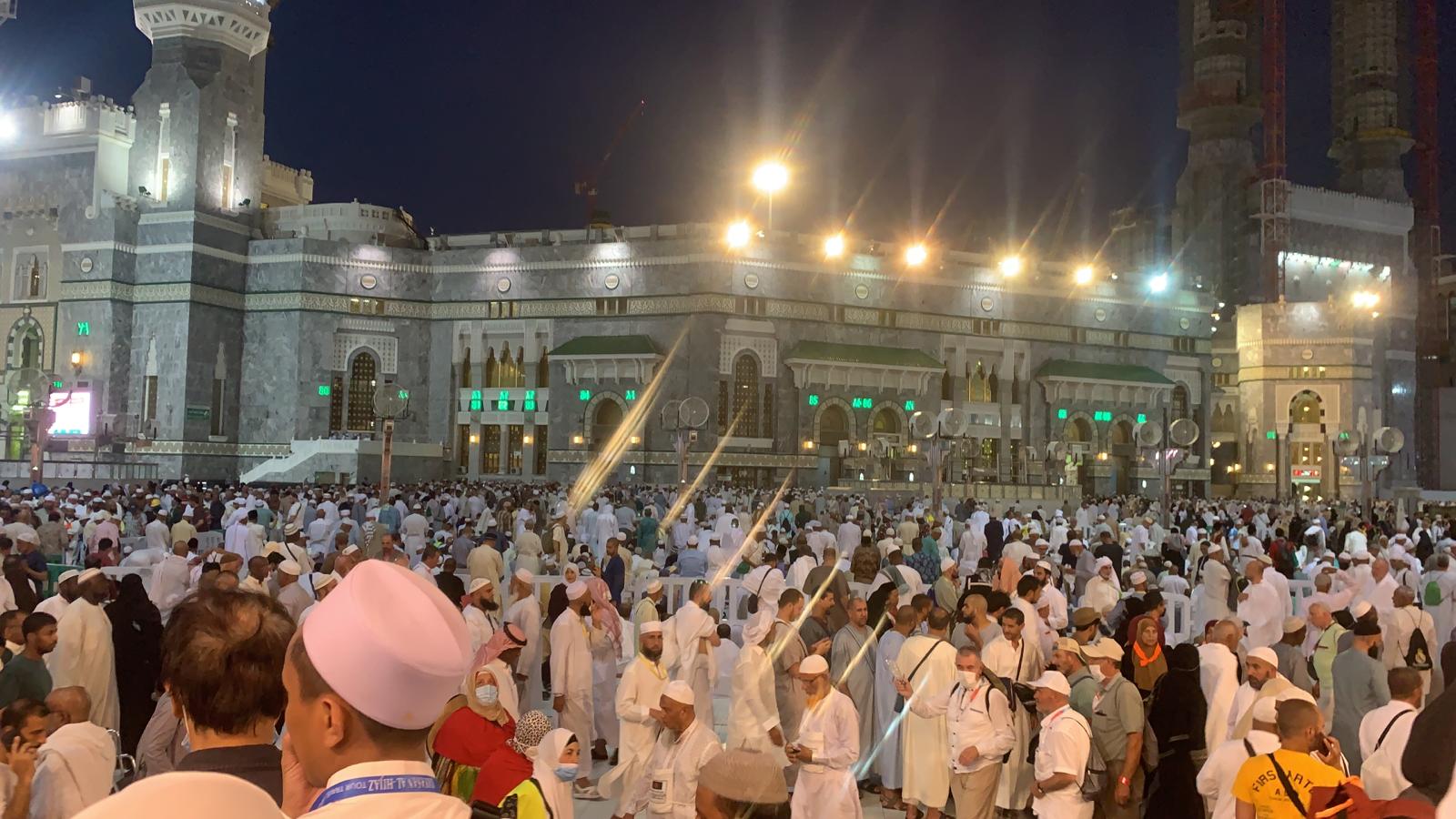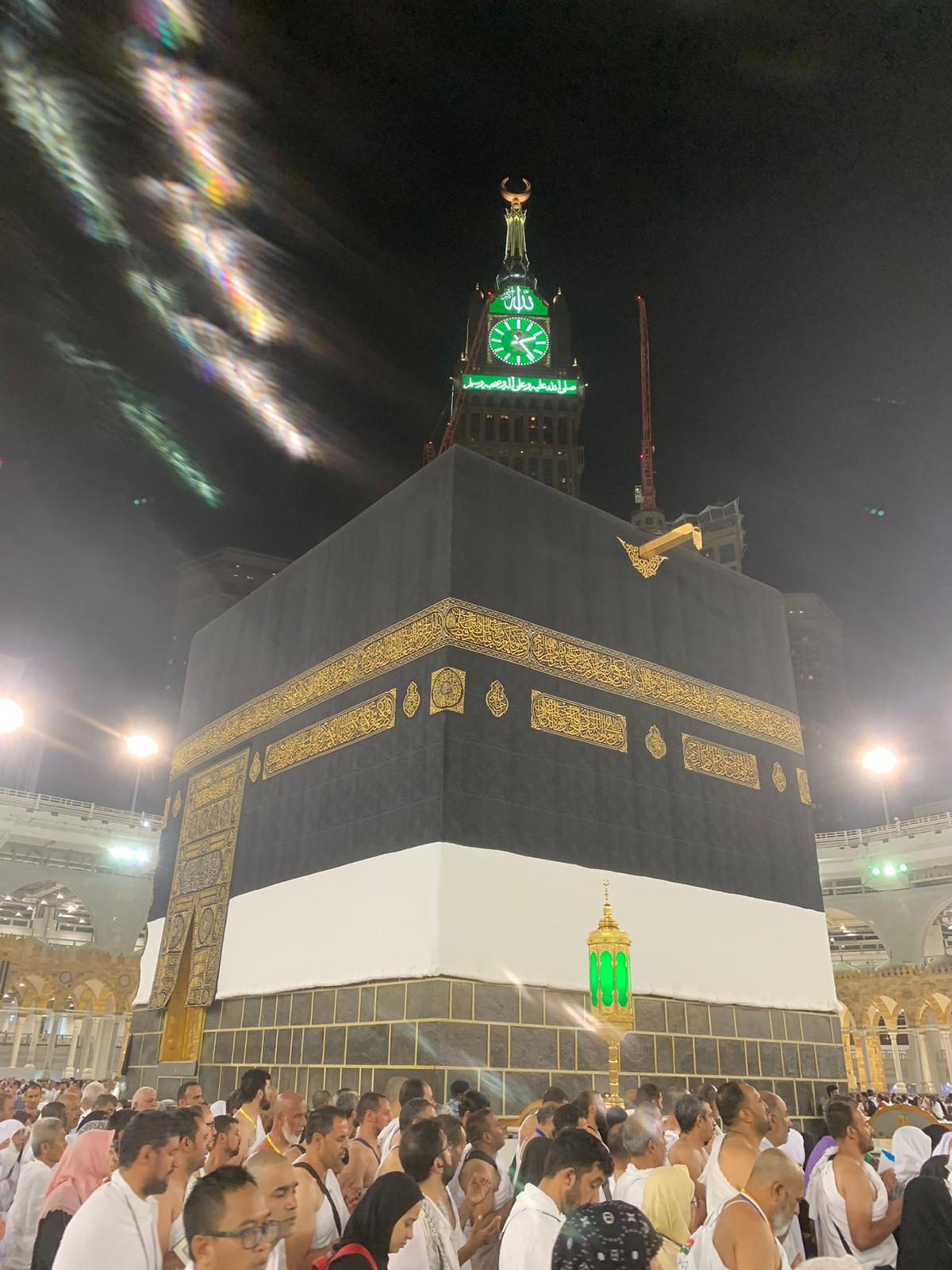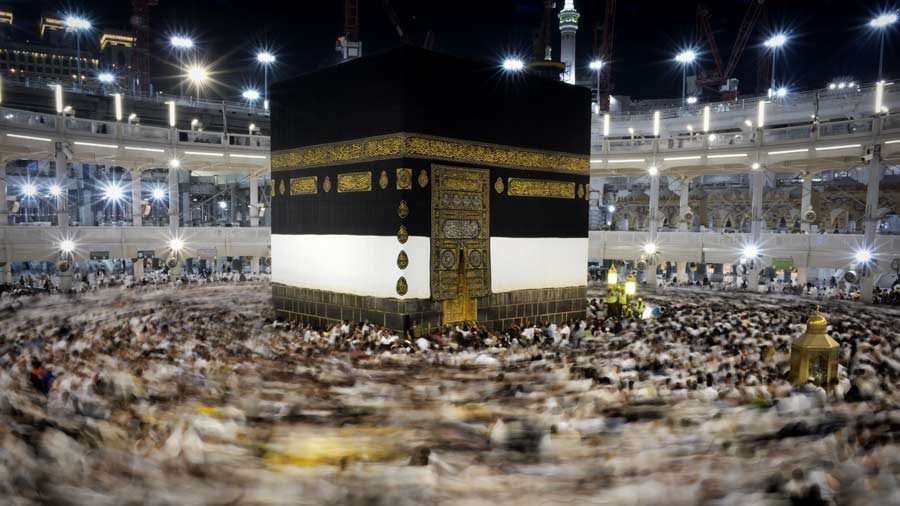A Million Muslims Are Preparing for the Hajj, and New Saudi Requirements
There is a 100% increase in the costs of performing the fifth pillar of Islam
One million Muslims are preparing to perform the hajj, which begins on July 6 – or Dhul-Hijjah 8 on the Islamic calendar – and lasts through July 12 (Dhu al-Hijjah 14). The pilgrims to Mecca include 850,000 from outside Saudi Arabia, according to official numbers. It is the first time that Muslims from outside of the country have been permitted to undertake the pilgrimage since the start of the coronavirus pandemic, as the hajj season during the past two years was limited to pilgrims from inside Saudi Arabia.
The number of participants in this year’s hajj is less than half the number of pilgrims in 2019, when it reached nearly 2.5 million pilgrims according to most estimates, while Saudi Arabia seeks to increase the number of pilgrims to nearly 5 million in the coming years.

Pilgrims gather outside Masjid al-Haram in Mecca ahead of the hajj, June 30, 2022. (Rani Kashkoosh)
According to the Islamic religion, hajj is the fifth pillar of Islam, and it is “for those who are able to make a way.” This means that a Muslim is required to perform the hajj once during his lifetime, but if he is unable to because of his financial circumstances or because he did not obtain a permit for hajj or due to a health condition, he is excused.
These rites take place on specific days and places according to Sharia, or Islamic law, which makes the hajj the most densely populated event in the world.
The costs of performing the hajj have risen significantly in 2022 compared to 2019, with increases ranging from about 20% in the Gulf countries that rely on private sector campaigns, and 50% in countries such as Indonesia and Malaysia, to an increase of 100% in countries such as Egypt, Algeria, and Pakistan.
Pilgrims from a large Muslim country like Pakistan are required to pay 755,000 rupees (approximately $3,670), while they paid 435,000 rupees (approximately $2,110) in 2019; pilgrims from Egypt will this year pay 120,000 Egyptian pounds (approximately $6,350) compared with 62,000 Egyptian pounds (about $3,000) in 2019; and the average price for performing hajj from the Gulf countries is about $5,500 in 2022, compared to $4800 in 2019. The prices for 2022 can be even higher depending on the services provided by the hajj campaign used by the pilgrim.
Some Islamic countries set the price of hajj per person for a basic campaign, such as Pakistan, Iraq, and Egypt, while other countries charge according to the services they provide during the performance of the obligatory rite.
“The prices have increased due to the new conditions related to security and safety; the profits of hajj campaigns do not exceed 20% of the price,” Muath Rashid, a Bahraini hajj official, told The Media Line.
“The Saudi authorities have imposed safety conditions, such as hajj campaigns from countries of the world are not allowed to bring in chefs, as was the case previously, and now they must contract with catering companies from inside Saudi Arabia, to prevent what was previously happening from poisoning incidents or even fires as a result of cooking inside the camps,” Rashid said.
It is true that prices have gone up, but there is quick organization. Everything has become easy from the stage of applying for hajj, until leaving Saudi Arabia.
“When we are in Mina (a neighborhood in Mecca), where there are tents where pilgrims rest, fires used to happen, but now, with the new system, the level of safety has increased and there are no fires that happen, but the costs have also increased,” he said.
“The area allocated to each pilgrim within the holy places and in the camps have also increased, and the conditions for bathrooms and toilets for each specific number of pilgrims have increased, which has also contributed to the increase in prices,” Rashid explained.
He added that the Saudi authorities now prevent buses and cars coming from outside Saudi Arabia from moving inside Makkah Al-Mukarramah, the official name for Mecca, during the hajj period, and have set higher standards for the buses that transport pilgrims. “It is true that prices have also increased, but the movement has become more organized and easier,” he said.
Ahmed Allam, an Egyptian hajj official, told The Media Line that “the costs have risen dramatically in Egypt because of the costs imposed by the new Saudi conditions. There is a huge increase in the prices of airline tickets, food, drink, and other services.”
“Previously, we used to take our equipment from here in Egypt, but now we must rent this equipment from Saudi companies, and we are also obligated to contract with Saudi catering companies, instead of bringing our chef from Egypt,” he added. “Not everyone can now pay all these costs, the numbers are much greater than what the average Egyptian citizen can bear.”

Visitors to Mecca walk around the Kaaba, the most sacred site in Islam, at the center of Islam’s most important mosque, Masjid al-Haram, ahead of the hajj pilgrimage on June 29, 2022. (Rani Kashkoosh)
The distribution of the number of pilgrims from each country was determined in 1988, when the ministers of Foreign Affairs and Islamic Cooperation met, and stipulated that Islamic countries and societies should allocate 1,000 pilgrims per million people in their population.
According to Saudi authorities, the reduction that came this year in the number of pilgrims was a reduction for all countries, in the same proportions, without any discrimination.
Saudi Arabia has also set other controls this year, including that a pilgrim must be no more than 65 years old, and must be fully immunized against COVID-19 with an approved vaccine.
The Saudi authorities will not give approval to those who performed the pilgrimage within the past five years unless they are among those responsible for the pilgrimage from their country, or one of the organizers; this applies to Saudis as well.
The pilgrim must also submit a negative PCR test result 72 hours before entering Saudi Arabia.
Other countries set their own conditions for pilgrims, with countries that have high population density – such as Egypt, Iraq, and Pakistan, holding a lottery for those who wish to perform hajj, since the number of applicants is usually 10 or more times the number allowed according to the hajj quota.
Not everyone can now pay all these costs, the numbers are much greater than what the average Egyptian citizen can bear
For Gulf countries, which have less population density, and Muslims from European countries or non-Islamic countries, approval for the hajj is on the basis of first-come, first-served registration.
An informed Saudi source confirmed to The Media Line that “Saudi Arabia does not take money for hajj, and it spends billions annually to develop the holy sites of hajj and umrah; there are projects worth billions of riyals to provide more services for pilgrims and umrah performers.”
Other expenses, he said, include “the hajj security force, organization and health matters, and other requirements to organize a safe hajj season and prevent any accidents that may lead to deaths, as has happened previously.”
He also stressed that Saudi Arabia provides all medical services for pilgrims “free of charge,” and that the decisions that have been taken regarding organizing the hajj are to raise the level of safety and security and prevent accidents.
Ahmed Al-Hardani, responsible for hajj campaigns from Iraq, told The Media Line, “The decrease in the number of pilgrims from Iraq is expected given the current circumstances regarding the coronavirus pandemic.”
He said that, over the last five years, there had been a “great development” in the hajj. “We see how it has become easier and more organized. It is true that prices have gone up, but there is quick organization. Everything has become easy from the stage of applying for hajj, until leaving Saudi Arabia,” he said.
Mohammad Qassem, an organizer of the hajj campaign in Kuwait, told The Media Line: “There is a really big development in hajj and in ease, but prices in general have increased by more than 40% from five years ago until now.”
“If the number of pilgrims increases, the prices will certainly decrease, because we are obligated to a certain number of organizers, and the costs of these organizers are definitely paid by the pilgrims. In general, the campaigns earn little, perhaps not more than 20% of the price only,” he added.


